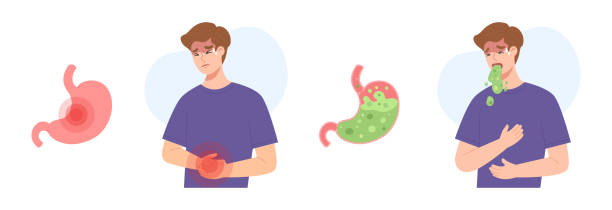What to Eat and Drink
Essential Foods That Stop Vomiting
Vomiting can be uncomfortable and debilitating, so individuals seek relief and techniques to calm their stomachs. Fortunately, certain meals have been shown to help reduce nausea and prevent vomiting. From easily digestible options like crackers and toast to hydrating options like clear broth and electrolyte-rich beverages, incorporating the right foods into your diet will help ease your stomach and restore balance. In this article, we’ll look at many foods that have antiemetic properties and how they can help with vomiting and overall well-being.

Understanding Vomiting and Its Causes
Vomiting is a reflex controlled by the brainstem and is frequently an indication of an underlying disease. It is a common occurrence caused by a variety of factors, including motion sickness, pregnancy, chemotherapy, food poisoning, gastroenteritis, disease, viruses, germs, and many more. In this section of this article, we will look at the most prevalent causes of vomiting and the role of dehydration in them.
Identifying Common Causes
Vomiting can be caused by a variety of illnesses, and it is critical to determine the underlying cause before providing proper therapy. Some of the most prevalent reasons for vomiting are:
- Motion sickness is a common cause of vomiting, particularly among children. It occurs when the inner ear and sight deliver conflicting messages to the brain, causing nausea and vomiting.
- Pregnancy: Vomiting is a frequent early pregnancy symptom, sometimes known as morning sickness. It results from hormonal changes that occur during pregnancy.
- Chemotherapy medications may cause nausea and vomiting as side effects. The intensity of the symptoms varies according to the type and dosage of drugs used.
- Food poisoning: Consuming contaminated food or water can result in vomiting and other gastrointestinal symptoms. Bacteria including Salmonella, E. coli, and Campylobacter are common culprits.
- Gastroenteritis is a viral or bacterial illness that affects the stomach and intestines, resulting in symptoms like vomiting, diarrhea, and abdominal pain.
The Role of Dehydration
One of the most common effects of vomiting is dehydration, which can cause major health problems if not managed. When someone vomits, they lose a lot of fluids and electrolytes from their body, which causes dehydration. The degree of dehydration varies according in the frequency and length of vomiting.
Drink plenty of fluids to avoid being dehydrated. Clear beverages like water, sports drinks, and electrolyte solutions are suggested. To minimize further stomach distress, avoid eating solid foods until the vomiting stops.
To summarize, vomiting is a common symptom of a variety of illnesses, and determining the underlying reason is critical for providing proper therapy. Dehydration is one of the most common problems of vomiting, so drink plenty of fluids to avoid it.

Dietary Approaches to Reduce Vomiting
When suffering vomiting, it is critical to focus on dietary measures that can help alleviate symptoms. The following are some dietary tips that can help decrease vomiting.
BRAT Diet and Other Bland Foods
The BRAT diet, which stands for bananas, rice, applesauce, and toast, is a popular method for minimizing vomiting. These foods are easy to digest and can help soothe the stomach. Other bland foods such as potatoes, noodles, and broth can be beneficial. Solid foods should be avoided until the patient has stopped vomiting and can tolerate them.
Hydration and Fluid Intake
Staying hydrated is critical when vomiting. Clear drinks such as water, tea, and electrolyte solutions can assist in replenishing fluids lost while vomiting. Sugary drinks and caffeine should be avoided because they can irritate the stomach even more. Sipping water gently and frequently can also assist in avoiding dry mouth.
Foods to Avoid
Certain foods may cause vomiting and should be avoided. Strong-smelling foods, such as fish, heavily seasoned dishes, and fried items, can exacerbate nausea. It is also critical to avoid favorite meals when feeling sick. Vegetables and other high-fiber foods should be avoided until vomiting has subsided and the patient is able to tolerate them.
Ginger is a natural medicine that can assist with nausea, but it may not be appropriate for everyone. Crackers and other dry, starchy meals can also help relieve nausea. Overall, staying hydrated and eating bland foods are crucial ways to avoid vomiting.

Medications and Remedies for Nausea
Nausea is a frequent symptom that can be caused by a number of things, including motion sickness, food poisoning, and viral infections. Fortunately, there are a number of drugs and home treatments that can help with nausea.
Over-the-Counter Solutions
Over-the-counter (OTC) drugs are widely available and effective in relieving nausea. Bismuth subsalicylate (Pepto-Bismol) and dimenhydrinate (Dramamine) are two typical over-the-counter treatments for nausea. Bismuth subsalicylate coats the stomach lining and reduces inflammation, whereas dimenhydrinate is an antihistamine that relieves nausea and vomiting.
In addition to over-the-counter drugs, sports drinks can help relieve nausea. Sports drinks include electrolytes and can help restore fluids lost while vomiting.
Prescription Treatments
Prescription drugs may be required in severe episodes of nausea. Antiemetics are medications that can help relieve nausea and vomiting. They act by inhibiting certain brain receptors that cause nausea.
Natural and Home Remedies
Several natural and home remedies can also help with nausea. Peppermint and mint tea are well-known for their ability to calm the stomach and relieve nausea. Ginger and chamomile teas are also useful for relieving nausea. Ginger includes chemicals that can help alleviate stomach inflammation, and chamomile tea has a relaxing impact on the body.
In addition to herbal teas, home remedies such as resting, gradually introducing water, and eating bland foods might help relieve nausea.
Overall, there are a variety of drugs and home treatments that can aid with nausea. It is critical to consult with a healthcare expert before taking any medications or attempting any home remedies to verify they are safe and beneficial for personal usage.

When to Seek Medical Attention
If vomiting continues for more than a day, get medical attention. In rare circumstances, vomiting can indicate a more serious health concern. Here are a few things to watch out for:
Recognizing Symptoms of Concern
temperature: If vomiting is accompanied by a temperature, it may indicate an infection that requires medical attention.
Symptoms of dehydration: Vomiting can cause dehydration, which is deadly if not handled. Signs of dehydration include dark urine, dizziness, and confusion.
Children who vomit are more prone to dehydration than adults. If a child is vomiting, it is critical to continuously watch them and get medical attention as needed.
Consulting Healthcare Providers
If vomiting lasts more than a day, get medical attention. They can aid in determining the underlying cause of vomiting and provide appropriate medication.
In rare circumstances, vomiting may indicate a medical emergency. If vomiting is followed by severe abdominal discomfort, chest pain, or rectal bleeding, you should seek emergency medical assistance right once.
Overall, it is critical to listen to your body and seek medical assistance if vomiting continues or is accompanied by troubling symptoms.
Conclusion
To summarize, knowing which meals can assist alleviate vomiting can be extremely helpful in managing symptoms and boosting recovery from gastrointestinal distress. Individuals suffering from nausea and vomiting can find comfort and assist their body’s healing process by ingesting readily digested, bland foods like crackers, bread, and bananas, as well as hydrating options like clear broth and electrolyte-rich beverages. Furthermore, herbal teas such as ginger and peppermint can have a relaxing impact on the stomach, helping to reduce nausea and vomiting. Remember to follow your body’s instincts, stay hydrated, and gradually resume solid foods as your symptoms improve. With the right nutritional choices and proper water, you may effectively combat vomiting and regain your health.
Trusted Health, Wellness, and Medical advice for your well-being


